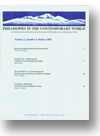|
articles |
|
1.
|
Philosophy in the Contemporary World:
Volume >
2 >
Issue: 4
Noel E. Boulting
Between Anthropocentrism and Ecocentrism
abstract |
view |
rights & permissions
| cited by
Three ways of relating the structures of human existence to the world are offered by ecological holism, moral extensionism, and biotic communitarianism. Leopold’s attempt to reconcile these three is examined in the light of Peirce’s categories, in order to ascertain how far Leopold’s final position is anthropocentric, ecocentric, neither, or both.
|
|
|
|
|
2.
|
Philosophy in the Contemporary World:
Volume >
2 >
Issue: 4
Bill Devall
Earthday 25:
A Retrospective of Reform Environmental Movements
abstract |
view |
rights & permissions
| cited by
Industrial growth and environmental protection have been in perpetual conflict. Reform environmental movements have attempted to address some of the worst abuses of nature by demanding government intervention to restrain pollution. Also, these reform movements have cooperated with corporate elites to obtain some controls on pollution. The 104th Congress attempted to destroy even weak pollution controls. New efforts to mobilize resistance are occurring. The deep, long-range ecology movement inspires resistance by affirming the joy of human participation in nature.
|
|
|
|
|
3.
|
Philosophy in the Contemporary World:
Volume >
2 >
Issue: 4
Peter J. Mehl
The Self Well Lost:
Psychotherapeutic Interpretation and Nelson Goodman’s Irrealism
abstract |
view |
rights & permissions
| cited by
In this paper, I consider Goodman’s philosophy in relation to psychotherapeutic interpretation. Goodman argues that we shouldunderstand our knowledge as a creative symbolic construction, and not as a set of ideas that match reality. The notion of “the world” does no epistemological work. Using an example of psychotherapeutic interpretation found in Erik Erikson’s writings, I argue that whileErikson suggests that he discovers in the patient’s showings and tellings the patient’s message and its meaning, I argue (with Goodman) that Erikson creates a narrative identity for his patient. The self is not found but fashioned, and it is deemed the true self because it coheres with Erikson’s general theoretic standpoint and is found to be cognitively and practically helpful for the patient. The conclusion is that selves, like worlds, are largely creative constructs.
|
|
|
|
|
4.
|
Philosophy in the Contemporary World:
Volume >
2 >
Issue: 4
James B. Sauer
Economies, Technology, and the Structure of Human Living
abstract |
view |
rights & permissions
| cited by
This paper argues that we need to rethink what the object of economic analysis is; that is, what the intelligible relations of an economy are. The paper starts by acknowledging that economies are a constitutive element of human habitats. It also agrees that modern economic analysis based on the price-auction market has provided substantial knowledge about the operation of economies. However, I argue that a more fruitful line of inquiry than the price-auction market is to focus on the schemes of personal and social meaning that set the context for economies. In developing this argument, I describe how such schemes function as a network of human relationships which provide the conditions of the possibilities of the emergence of economic technologies. That is, the explanandum of economy is not the classical price-auction market but the recurrent social cooperative structure (order) of economy in which markets are embedded.
|
|
|
|





